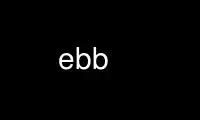
This is the command ebb that can be run in the OnWorks free hosting provider using one of our multiple free online workstations such as Ubuntu Online, Fedora Online, Windows online emulator or MAC OS online emulator
PROGRAM:
NAME
extractbb, ebb - extract bounding box information from graphics files
SYNOPSIS
extractbb [-v|-q] [-O] [-m|-x] file...
DESCRIPTION
For each JPEG, PNG, or PDF file given on the command line, extractbb extracts the bounding
box information and writes it into a file with extension .xbb, together with some header
information. These files can then be used by dvipdfmx or other programs. For PDF files,
the number of pages and the PDF version number are reported as well. The input filename
extension may be in upper or lower case.
If called as ebb, the output is written in the ``bb'' format (and with extension .bb) as
used by dvipdfm. Xbb may be defined as a synomym for extractbb on your system.
OPTIONS
-v Be verbose.
-q Be quiet.
-O Write output to standard output.
-m Write output in dvipdfm's ``bb'' format.
-x Write output in dvipdfmx's ``xbb'' format (default), which is the same as that
used by pdfTeX.
OUTPUT FORMATS
Here are more details about the bb and xbb formats:
The original ebb (from dvipdfm) ignored density information in bitmap images, and
generated bounding boxes with 100px = 72bp = 1in. Unfortunately, screenshots (especially)
tend to look bad with this approach.
So, extractbb (from dvipdfmx) uses density information if present. Otherwise, it
generates bounding box with 100px = 100bp. This is what pdfTeX does.
Use ebb online using onworks.net services
